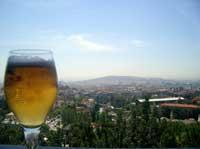Memory of hair

Researchers from the Department of Biology at the University of Utah have been working with a technology that can have several applications for years. Anthropologists, archaeologists, doctors or police say they can be useful. In short, recent discoveries come to confirm or confirm that single-hair analysis is an important source of information.
The characteristics of drinking water depend on the country. And Utah researchers have studied the oxygen-18 and hydrogen-2 isotopes of water molecules, the amount or percentage of which depends on precipitation, altitude, and other common characteristics of a given location.
As explained by the members of Utah, these isotope data have made it possible to know “quite reliably” what was the origin of the water samples collected in 33 US countries.
“The human body takes advantage of the hydrogen and oxygen atoms that form the water to form the proteins necessary to form the hair (like keratin). And on this occasion we have verified that there is a great similarity between the composition of the water consumed by a person and his hair”, they clarify.
Confirming hypothesis

The characteristics of drinking water depend on the country. If consumed, traces can be found on the hair itself. (Photo: D. Sharon Pruitt.
In addition to the samples collected in the hairdressers of 65 villages, the hair of a man who has arrived from Beijing to Salt Lake City has been analyzed. The percentage of oxygen-18 and hydrogen-2 isotopes in hair raised in the last three months was very high and the data was closely related to what was observed in samples collected in Beijing. However, in the hair closest to the skin (i.e. growing after the arrival of Utah), scientists claim that the concentration of isotopes decreased greatly. This data also corresponds to the characteristics of tap water in the state of Utah.
The hypotheses presented at the beginning of the investigation were therefore confirmed thanks to the results obtained. They say that each person’s geographical movements are “recorded” in the hair.
The US research group Utah has analyzed not only tap water, but also bottled water, beer (Budweiser) and soda drinks, such as Coca-Cola, obtained in each of them.
Analysis of isotopes has led to the conclusion that many of the foods and drinks (including milk) that can be found in a “standard menu” of a given country have the same local water at their base. The similarity of the “isotopic footprint” was not in any case comparable. Water from the local fountain and soda had a similar composition, but, for example, beer was more distinct.

In addition to water, the consumption of beers or soda drinks from a certain place can be a “key” to know the geographical movements of each. (Photo: atomicjeep).
It seems that the tests of analysis of the composition of the hair are already underway to investigate migrations of animals or take advantage of police purposes. According to the investigators, for example, the method has been used to clarify where a victim and his alleged killer came from or belonged.
However, on this path you can find many difficulties. It is possible, for example, that the drink you consume in a certain place has been produced elsewhere or that you yourself have previously purchased it elsewhere. In addition, the method does not guarantee the safe identification of the geographical origin of a hair sample. “But it can help a lot to reduce opportunities,” the researchers say.
Published in 7K.
Buletina
Bidali zure helbide elektronikoa eta jaso asteroko buletina zure sarrera-ontzian








